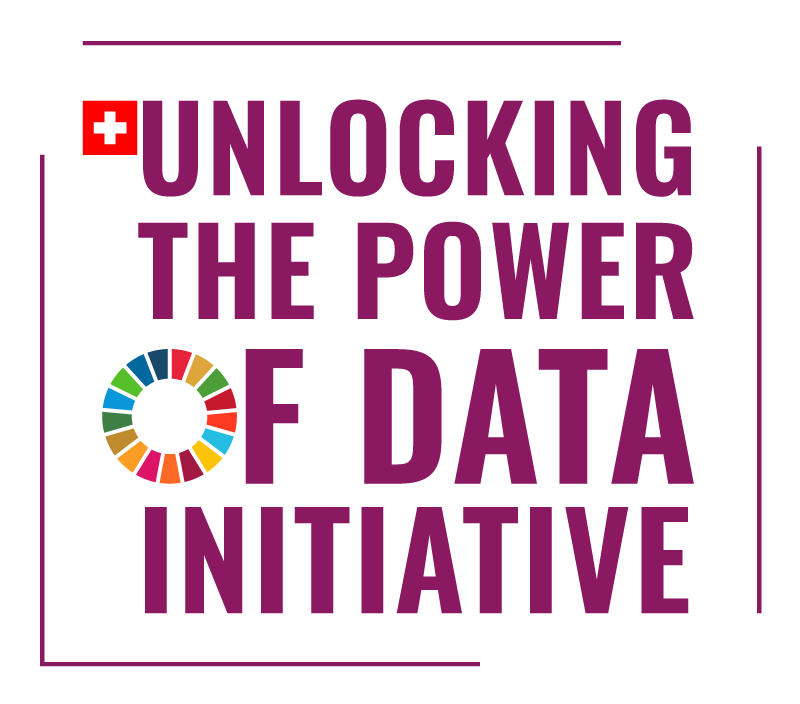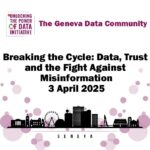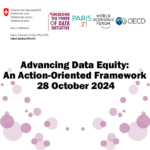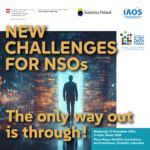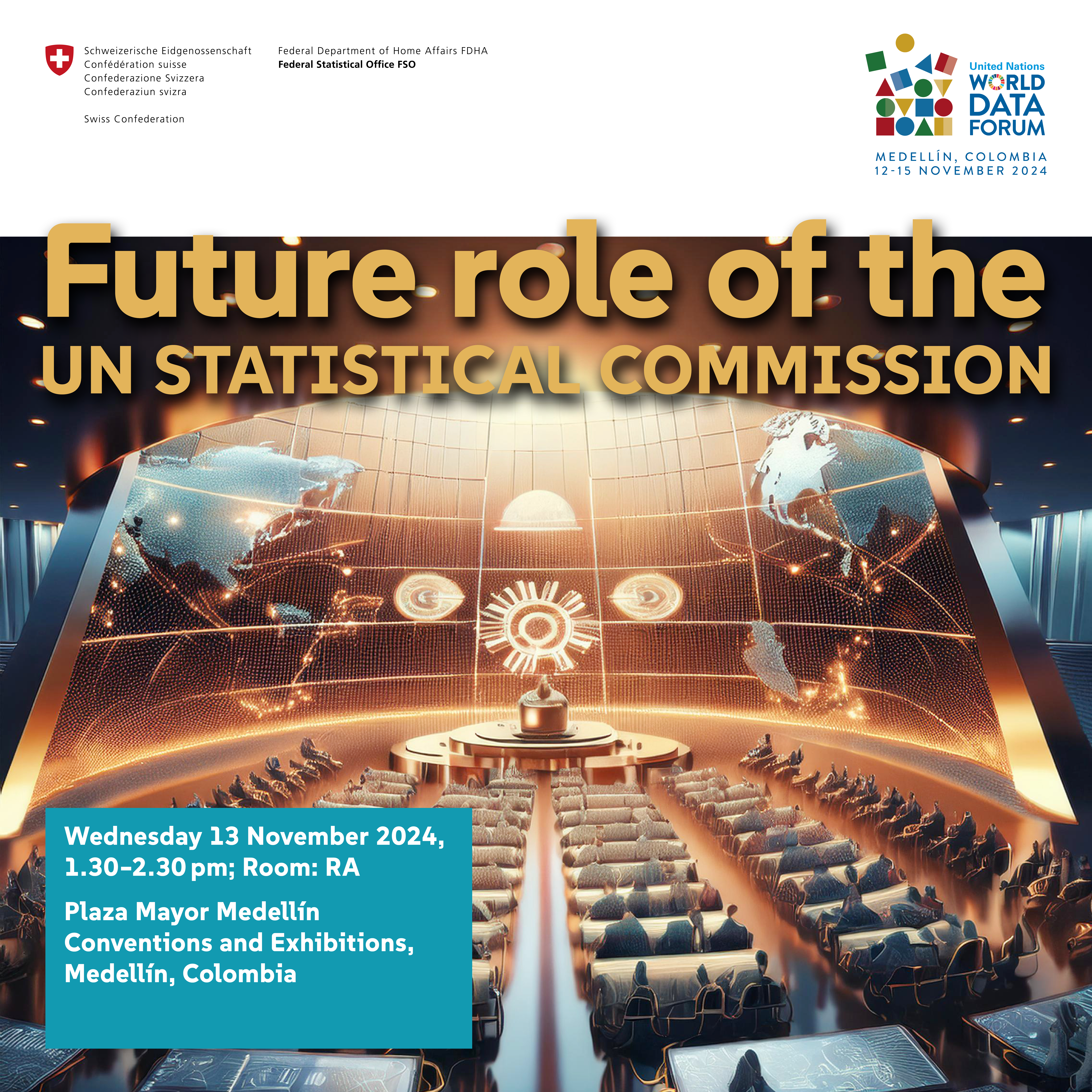| Hierarchy of objectives Strategy of Intervention |
Key Indicators | Data Sources Means of Verification |
||
| Impact (Overall Goal) | Impact Indicators | |||
| Decisions and discussions are made and conducted based on facts. | This will not be measured due to the lack of resources. | –
|
||
| Outcomes | Outcome Indicators | External Factors
(Assumptions & Risks) |
||
| Outcome 1 (WS1 Data Literacy):
The public at large knows where to access and understands the role of data and statistics in making fact-based decisions. |
This will not be measured due to the lack of resources. | – | Sufficient resources (financial, personal, time) are available to support and participate in this workstream.
All involved partners have an interest to participate in the workstream. The events of the workstream are well attended, including by data users such as policy-makers. |
|
| Outcome 2 (WS2 Financing Data): More and better financing is allocated to data and statistics.
|
This will not be measured due to the lack of resources. | – | Sufficient resources (financial, personal, time) are available to support and participate in this workstream.
All involved partners have an interest to participate in the workstream. The events of the workstream are well attended, including by data users such as policy-makers. |
|
| Outcome 3 (WS3 Data Management): National statistical offices extend their mandates and take on the role of national data stewards.
|
This will not be measured due to the lack of resources. | – | Sufficient resources (financial, personal, time) are available to support and participate in this workstream.
All involved partners have an interest to participate in the workstream. The events of the workstream are well attended, including by public data producers outside of statistical offices. |
|
| Outcome 4 (WS4 Data Science): Data science provides new tools to support and foster evidence-based decision-making. | This will not be measured due to the lack of resources. | – | Sufficient resources (financial, personal, time) are available to support and participate in this workstream.
All involved partners have an interest to participate in the workstream. The events of the workstream are well attended, including by data users such as staff from public administrations. |
|
| Outcome 5 (WS5 Population projections and climate change): Statistical population scenarios adequately take into account the consequences climate change might have on population dynamics.
|
This will not be measured due to the lack of resources. | – | Sufficient resources (financial, personal, time) are available to support and participate in this workstream.
All involved partners have an interest to participate in the workstream. The events of the workstream are well attended, including by climate experts. |
|
| Outcome 6 (WS6 Health Data):
To be defined at a later stage.
|
This will not be measured due to the lack of resources. | – | To be defined with the outcome.
|
|
| Outputs (per outcome) | Output Indicators | Means of verification | – | |
| For outcome 1: The public at large knows where to access and understands the role of data and statistics in making fact-based decisions. | ||||
| Output 1.1 | Dialogues between data producers and users are held to understand each other’s needs. | # feedbacks on needs from data users and data producers received. | Answers through moderators’ question with an interactive app like Slido or Menti. | – |
| Output 1.2 | Policy-makers are confronted with the role and importance of data for advocacy and policy-making. | # events organised within a political conference,
# policy-makers participating in Project Rosling events. |
Project Rosling planning,
answers through moderators’ question with an interactive app like Slido or Menti. |
– |
| Output 1.3 | Data and statistical products are developed to better suit the needs of non-expert data users. | # new products produced,
# views of new products, # data users and producers involved in the activities. |
Physical and digital products,
answers through moderators’ question with an interactive app like Slido or Menti. |
– |
| For outcome 2: More and better financing is allocated to data and statistics. | ||||
| Output 2.1 | Good practices are promoted to advocate for data financing, such as the Clearinghouse for Financing Development Data. | # events and activities organised to promote financing data. | Project Rosling planning | – |
| Output 2.2 | Collaboration between stakeholders advocating for resources for data is increased. | # dialogues organised between at least two stakeholders. | Project Rosling planning | – |
| Output 2.3 | Policy-makers are informed about the opportunities provided by data if correctly funded. | # exchanges with policy-makers,
# new statistics and data projects financed. |
Project Rosling planning, donor information. | – |
| For outcome 3: National statistical offices extend their mandates and take on the role of national data stewards. | ||||
| Output 3.1 | Switzerland’s know-how in the FSO’s transformation is presented as good practice. | # presentations from the Swiss practice,
# invitations received for Switzerland to share its experience. |
Project Rosling planning, invitations received. | – |
| Output 3.2 | Geneva is recognised as a data hub in the context of discussions on data stewardship. | # exchanges with the data producers and users of the International Geneva. | Project Rosling planning. | – |
| Output 3.3 | Data stewardship concepts and experiences are documented and presented. | # published content from the statistical community on Data Stewardship. | Publications from UN Working Group on Data Stewardship, UNECE Task Force, Eurostat, OECD, and individual NSOs. | – |
| For outcome 4: Data science provides new tools to support and foster evidence-based decision-making. | ||||
| Output 4.1 | Data science knowledge and know-how sharing is facilitated both within the federal administration and beyond. | # “Data Science and AI for public good” webinars held,
# articles and papers published, # of viewers. |
Project Rosling planning and platforms views. | –
|
| Output 4.2 | Knowledge on themes particularly important for public policies and evidence-based decision-making is created and disseminated. | # “Data Science for public policy” webinars held,
# of viewers. |
Project Rosling planning and platforms views. | – |
| Output 4.3 | Data science methods literacy is fostered in the public administration to provide tools to as many stakeholders as possible to support evidence-based decision-making. | # documentation created,
# stakeholders receiving the publication. |
Physical or digital publications, distribution list. | – |
| Output 4.4 | Actors from the public and private sectors and academia are brought together to discuss how their combined efforts and skills can enable data analytics platforms and data hubs to evolve for the common good. | # exchanges with stakeholders held. | Reports from Data Science Competence Center. | – |
| For outcome 5: Statistical population scenarios adequately take into account the consequences climate change might have on population dynamics. | ||||
| Output 5.1 | The state of the art regarding the consideration of climate change in population scenarios and academic research in this field is known and documented. | # reports, presentations or exchanges held on the state of the art. | Physical or digital products. | – |
| Output 5.2 | Interdisciplinary exchange between experts from the field of demography and the field of climate research has taken place. | # meetings allowing exchanges between climate research experts and demographers. | Project Rosling planning. | – |
| Output 5.3 | The results are disseminated in an adequate format allowing to feed relevant information into the public debate and raise awareness on the challenges related to the climate-population nexus. | # activities that present the results of the discussion on climate change in population projections. | Physical or digital products. | – |
| For outcome 6: To be defined at a later stage | ||||
| Output 6. | To be defined at a later stage | – | ||
| Activities per output 1.1: Dialogues between data producers and users are held to understand each other’s needs. | ||||
| · Organise session “Do we even need data and statistics? A user’s perspective.”
· Organise session “Keeping data in the spotlight – how it can help us to understand our planet?” (to be confirmed). |
||||
| Activities per output 1.2: Policy-makers are confronted with the role and importance of data for advocacy and policy-making. | ||||
| · Organise side-event to the High-Level Political Forum 2023 in coordination with financing data workstream (to be confirmed). | ||||
| Activities per output 1.3: Data and statistical products are developed to better suit the needs of non-expert data users. | ||||
| · Produce a video displaying the world evolution taking into account climate elements,
· Organise session at the World Statistics Congress 2023 “Reaching the general public: Data and Statistics for Dummies.” |
||||
| Activities per output 2.1: Good practices are promoted to advocate for data financing, such as the Clearinghouse for Financing Development Data. | ||||
| · Organise a session “Smart data finance – Coordinating our efforts to leave no one behind” (to be confirmed), | ||||
| Activities per output 2.2: Collaboration between stakeholders advocating for resources for data is increased. | ||||
| · Organise an open event at the PARIS21 Spring Meeting. | ||||
| Activities per output 2.3: Policy-makers are informed about the opportunities provided by data if correctly funded. | ||||
| · Organise a side-event at the High-Level Political Forum 2023 in coordination with data literacy workstream (to be confirmed). | ||||
| Activities per output 3.1: Switzerland’s know-how in the FSO’s transformation is presented as good practice. | ||||
| · Organise a side-event of the UN Statistical Commission in Feb/Mar 2023 in New York (to be confirmed);
· Organise a session called “Data stewardship – a new field of work for national statistical offices” at the World Statistics Congress 2023 in order to include the wider data community in the discussion; · Participate in external events on data stewardship. |
||||
| Activities per output 3.2: Geneva is recognised as a data hub in the context of discussions on data stewardship. | ||||
| · Organise a workshop in Geneva to prepare the Committee on Statistics and Statistical Policy (CSSP, OECD) and the Conference of European Statisticians (CES, UNECE) sessions on data stewardship. | ||||
| Activities per output 3.3: Data stewardship concepts and experiences are documented and presented. | ||||
| · Participate in the UN Working Group on Data Stewardship and the UNECE Task Force to develop definitions, standards and guidelines;
· Publish a journal article to describe Switzerland’s experience of data stewardship. |
||||
| Activities per output 4.1: Data science knowledge and know-how sharing is facilitated both within the federal administration and beyond. | ||||
| · Organise “Data Science and AI for public good” webinar series: 45-minute presentations followed by questions and answers;
· Publish blog articles and position papers focusing on the following themes: how the data science process works, how it can lead to better decision-making, and privacy-preserving data science. |
||||
| Activities per output 4.2: Knowledge on themes particularly important for public policies and evidence-based decision-making is created and disseminated. | ||||
| · Organise “Data Science for Public Policy” keynote speech webinars. | ||||
| Activities per output 4.3: A culture of data science methods literacy in the public administration is fostered to provide as many tools as possible to make evidence-based decisions. | ||||
| · Create a presentation for entry-level to middle-management in the Swiss public sector explaining the basics of Data Science methods, including artificial intelligence. | ||||
| Activities per output 4.4: Actors from the public and private sectors and academia are brought together to discuss how their combined efforts and skills can enable data analytics platforms and data hubs to evolve for the common good. | ||||
| · Hold initial bilateral exchanges with relevant stakeholders to prepare discussions on data analytics platforms and data hubs. | ||||
| Activities per output 5.1: The state of the art regarding the consideration of climate change in population scenarios and academic research in this field is known and documented. | ||||
| · Take note of existing scientific work at the intersection of demographic and climate research dealing with the consequences of climate change on demographics (vital events and migration). | ||||
| Activities per output 5.2: Interdisciplinary exchange between experts from the field of demography and the field of climate research has taken place. | ||||
| · Organise a session called “Population scenarios and climate change: what are the challenges for official statistics?” at the World Statistics Congress in July 2023;
· Organise a panel/workshop on population scenarios during the regional demographic meeting of Germany, Austria and Switzerland in autumn 2023 addressing the question “What does climate change mean for the development of population scenarios of public statistics?”; · Involve relevant experts in Swiss climate research in the expert groups for the development of hypotheses for Switzerland’s next population scenarios. |
||||
| Activities per output 5.3: The results are disseminated in an adequate format allowing to feed relevant information into the public debate and raise awareness on the challenges related to the climate-population nexus. | ||||
| · Disseminate results of the workstream in a special publication (as experimental statistics or in a qualitative publication);
· If appropriate, organise a public event in the context of the special publication. |
||||
| Activities per output 6.1: To be defined at a later stage | ||||
| · To be defined at a later stage | ||||
Logframe
Latest News
